South Sudanese President vows to leave work to those opposed to 28 states
January 11, 2016 (JUBA) – President Salva Kiir has vowed to leave the fate of 28 states he unilaterally created on 2 October to those who will continue to oppose them, insisting that he had not violated the peace agreement he signed with opposition parties on the basis of the constitutionally recognized 10 states in South Sudan.

“Many people have been blaming the government and myself that we have violated the agreement. But I always tell them that we have not violated the agreement. This is a demand of the people and they have been asking for it for a very long time,” president Kiir told the gathering at the convention on Saturday.
“And in any case, if we have now agreed to implement this agreement, if Taban [Deng] comes and tells me then now you revoke this 28 [states], I will stand in front of the people here and I will tell them that this is what Comrade Taban is saying that I have to revoke [that] the order of your 28 states. And then I will get down and go. I will leave the work to Taban,” he said.
The head of state was making the comments in direct reference to the opposition faction of the SPLM-IO led by former vice president, Riek Machar, who shall become the first vice president of transitional government in accordance with the peace agreement.
Taban Deng Gai, chief negotiator, who represented the SPLM-IO at the request of South African Deputy President, Cyrill Ramaphosa, only for opening and closing sessions of the convention by the faction of the SPLM in government, earlier warned that the issue of the 28 states was an obstacle to peace implementation.
“Comrades, let us be very careful with the 28 states,” Gai told the SPLM convention during his remarks at the Freedom Hall in Juba.
He said the peace agreement was signed on the basis of the 10 states and should not be tempered with for now until the right time when the matter can be collectively tackled during the transitional period.
Gai also cited conflicts which may arise between communities over boundaries and lands taken from them and given to others, particularly to neighbouring Dinka communities from which the president hails.
Representative of the former detainees, Deng Alor Kuol, also called on the government to abide by the peace agreement based on the 10 states, but further called on the parties to “reconcile” the 28 with 10 states.
It was not however clear what president Kiir meant when he vowed he would leave the work or responsibility of the states to the opposition and leave.
Observers close to the decision making of the government’s inner circles ruled out his resignation if defeated in the matter, saying it could be an indication of lack of cooperation to come between the peace factions and of serious hurdles ahead in the implementation of the peace deal as rival leaders may be backed by proponents and opponents of the 28 states.
Kiir argued that the 28 states have been a long-time demand of the people of South Sudan, despite his government’s rejection of the similar demand from the SPLM-IO during the peace negotiations in Addis Ababa, Ethiopia, in which the opposition proposed creation of 21 federal states based on the old colonial districts in the country.
The SPLM-IO at the time argued that federalism and creation of more administrative units closer to the people was a long time demand of the people.
The government at the time argued that it was not time to create more states or establish a federal system of governance, citing lack of resources to run the new more state governments. The opposition was forced by the IGAD mediation to sign the agreement on the basis of the current 10 states with the provision that the system of federalism and creation of more states would be dealt with during constitutional making process by a transitional government of national unity.
However, about 40 days after the signing of the agreement in August 2015, the government decided to unilaterally create 28 states, contrary to the provisions in the peace deal.
Opposition factions in the country including civil society organizations and regional and international bodies reacted in condemnation of the action as a violation of both the transitional constitution and the peace agreement.
President Kiir has so far gone ahead with further implementation when the national legislature endorsed the amendments to create the 28 states and the president appointed governors for the new states.
Former president of Botswana, Festus Mogae, chairman of the highest overseer body in the peace deal, the Joint Monitoring and Evaluation Commission (JMEC), on Friday said the matter over 28 states had become a “complicating factor” and his office would therefore concentrate on formation of a transitional government of national unity at the center in Juba and leave the conflict over the states unresolved for now.
There are however fears that serious conflicts may emerge between factions in the national government over the fate of states in the country.
(ST)
